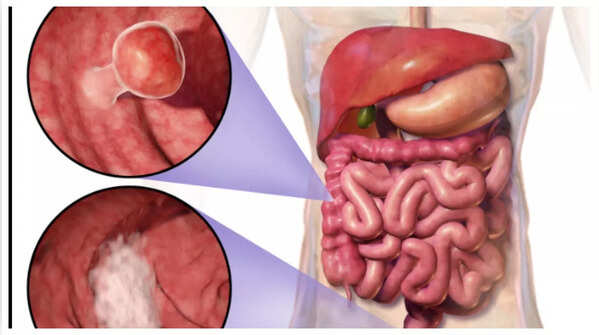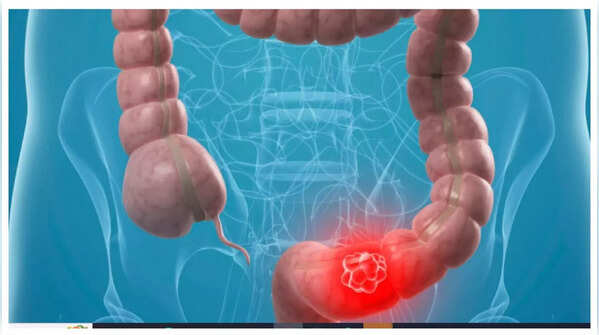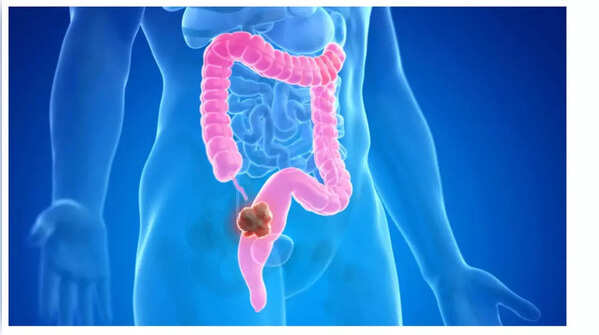Colon cancer, also known as colorectal cancer, is a disease that develops in the colon or rectum. It often begins as small, noncancerous clumps of cells called polyps, which can become cancerous over time. While most colon cancers occur randomly, factors like family history, obesity, and lifestyle can increase the risk. Many cases develop after age 50, and early symptoms can be mild, often mistaken for digestive issues or stomach infections. However, certain warning signs should not be ignored.

One of the earliest indicators of colon cancer is a noticeable change in bowel habits. This can manifest as:
These changes may seem minor or temporary, and many people attribute them to diet, stress, or infections. However, if these bowel changes persist for more than a few days or recur frequently, they could signal colon cancer. Persistent changes may indicate a growing tumor disrupting normal bowel movements.

The presence of blood in stool should never be dismissed, regardless of whether it is colon cancer or not. It can appear as:
Sometimes, the bleeding is minimal and not visible to the naked eye, but it can lead to anemia over time. While blood in the stool can result from various conditions like hemorrhoids or infections, it's crucial to rule out colon cancer, especially if it occurs repeatedly or is accompanied by other symptoms.

Persistent abdominal discomfort is another early symptom often overlooked. This can include:
Such discomfort can be mistaken for indigestion or other minor digestive issues, such as constipation. However, if the pain is ongoing and unrelated to diet or lifestyle changes, it could indicate a tumor causing irritation or blockage in the colon.

Unexplained and persistent fatigue and weakness can be a subtle sign of colon cancer, particularly when combined with other symptoms. Slow, unnoticed bleeding in the colon can lead to iron deficiency anemia. With fewer red blood cells, the body cannot transport enough oxygen, resulting in fatigue, shortness of breath, and weakness. While these symptoms may be dismissed as stress or lack of sleep, they should be evaluated.

Losing weight without any conscious effort is a common symptom in most cancers, including colon cancer. When the body is fighting cancer, the immune system is constantly activated, and tumors can affect digestion and appetite. If you experience significant weight loss without changes in diet or exercise, it's important to consult a doctor. This symptom often appears later in the disease but can sometimes be an early warning sign.

Disclaimer: This article is for informational purposes only and does not substitute professional medical advice. Always consult with a qualified healthcare provider for any health concerns or before making any decisions related to your health or treatment.
Sources:

What you eat plays a crucial role. Eat a well-balanced and nutritious diet.

If you suffer from any of these, do not ignore.

A cancer diagnosis profoundly impacts a person mentally, often triggering a cascade of intense emotions. Initially, shock, disbelief, and a sense of overwhelm are common, as individuals grapple with the life-altering news and the uncertainty of their future. This can quickly evolve into significant fear and anxiety about treatment, potential pain, side effects, body image changes, financial burdens, and ultimately, mortality.

Consult a doctor, if you experience any of these symptoms. Donot wait for the symptoms to worsen.

Exercise helps prevent many ailments, including cancer

Make sure you do not ignore these symptoms

If you observe these signs, talk to a doctor.

Do not ignore these signs

Identify the symptoms before its too late
Newer articles
Older articles
 Greg Chappell Hails Rishabh Pant's Revolutionary Impact on Cricket
Greg Chappell Hails Rishabh Pant's Revolutionary Impact on Cricket
 Smith Targets Second Test Return After Baseball Cage Recovery in New York
Smith Targets Second Test Return After Baseball Cage Recovery in New York
 Rishabh Pant's Somersault Celebration Deemed 'Unnecessary' by Doctor Who Oversaw His Recovery From Near-Fatal Crash
Rishabh Pant's Somersault Celebration Deemed 'Unnecessary' by Doctor Who Oversaw His Recovery From Near-Fatal Crash
 Gavaskar Calls for Kuldeep Yadav's Inclusion in 2nd Test Amid Bumrah Fitness Concerns
Gavaskar Calls for Kuldeep Yadav's Inclusion in 2nd Test Amid Bumrah Fitness Concerns
 Rishabh Pant's Composed Reply Dismisses Harry Brook's Sledge in Edgbaston Test: Key Partnership Boosts India
Rishabh Pant's Composed Reply Dismisses Harry Brook's Sledge in Edgbaston Test: Key Partnership Boosts India
 'Manjummel Boys' Star Soubin Shahir Denies Arrest in Film Finance Dispute: Claims of Misleading Accounting Spark Police Probe
'Manjummel Boys' Star Soubin Shahir Denies Arrest in Film Finance Dispute: Claims of Misleading Accounting Spark Police Probe
 Harshit Rana Released: Indian Pacer Exits Squad Before Second England Test in Birmingham
Harshit Rana Released: Indian Pacer Exits Squad Before Second England Test in Birmingham
 Bangladesh Test Captain Najmul Hossain Resigns After Sri Lanka Defeat
Bangladesh Test Captain Najmul Hossain Resigns After Sri Lanka Defeat
 Samsung Unveils Galaxy A35 5G and A55 5G Prices, Availability
Samsung Unveils Galaxy A35 5G and A55 5G Prices, Availability
 Mirabai Chanu: Weightlifting Demands Constant Mental Focus, Even During Family Time
Mirabai Chanu: Weightlifting Demands Constant Mental Focus, Even During Family Time